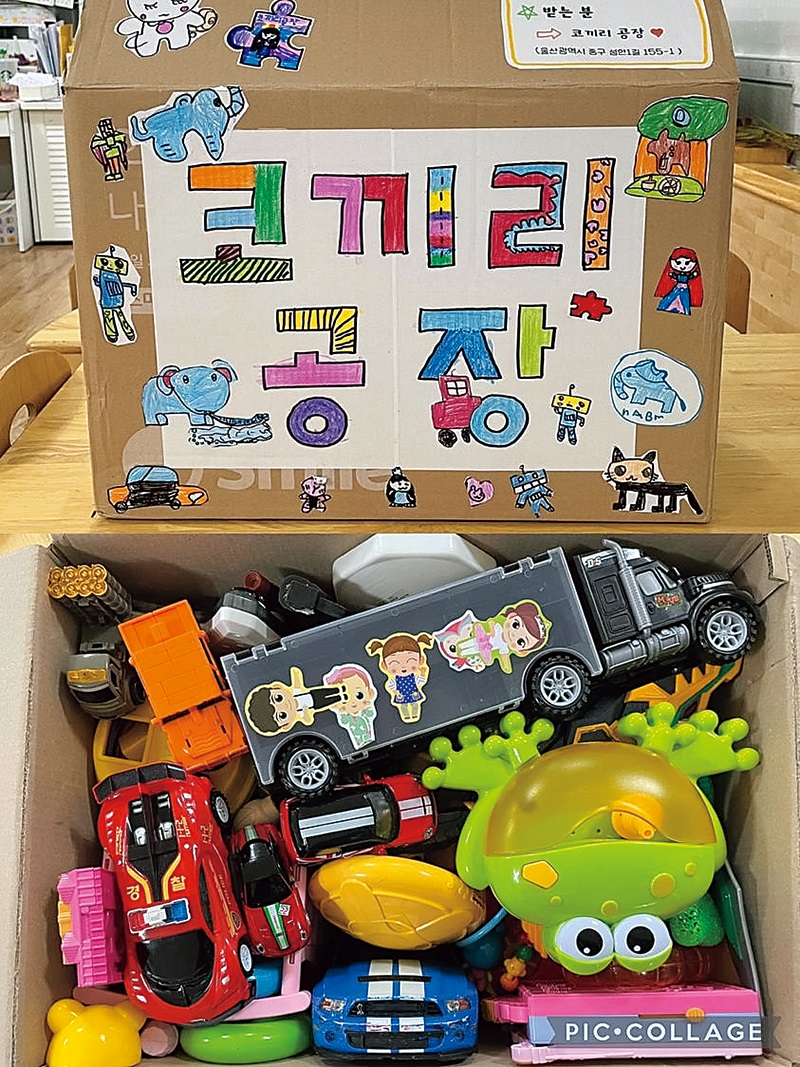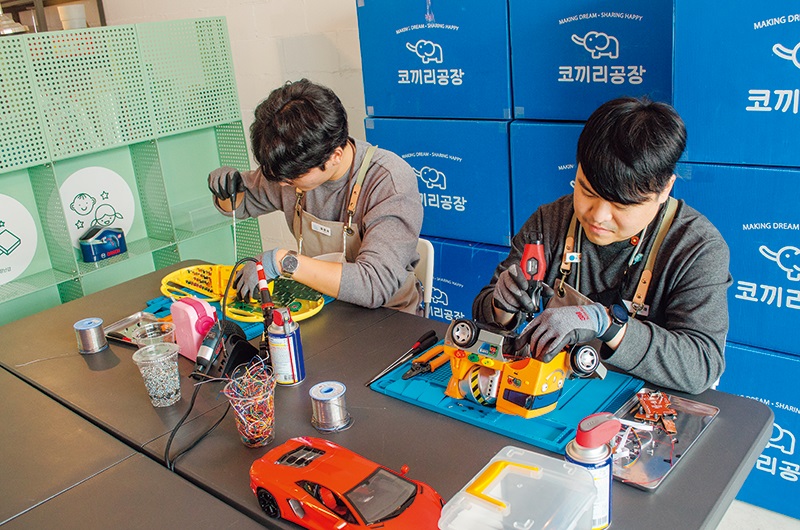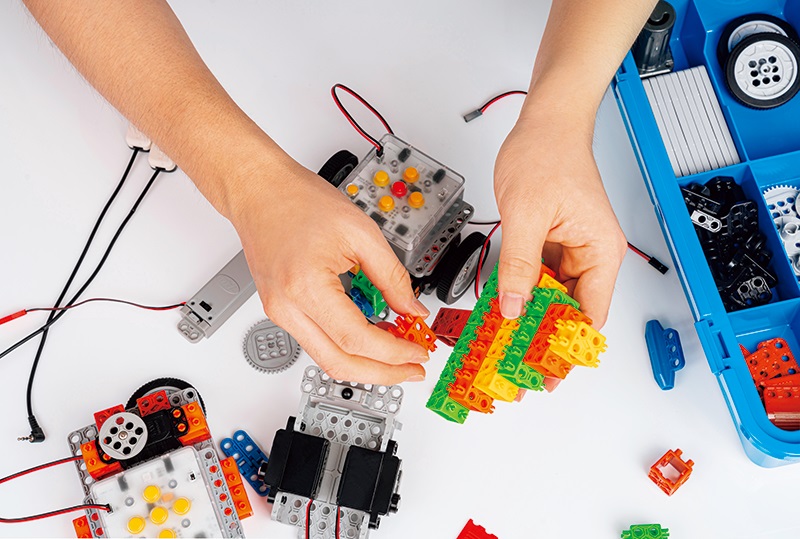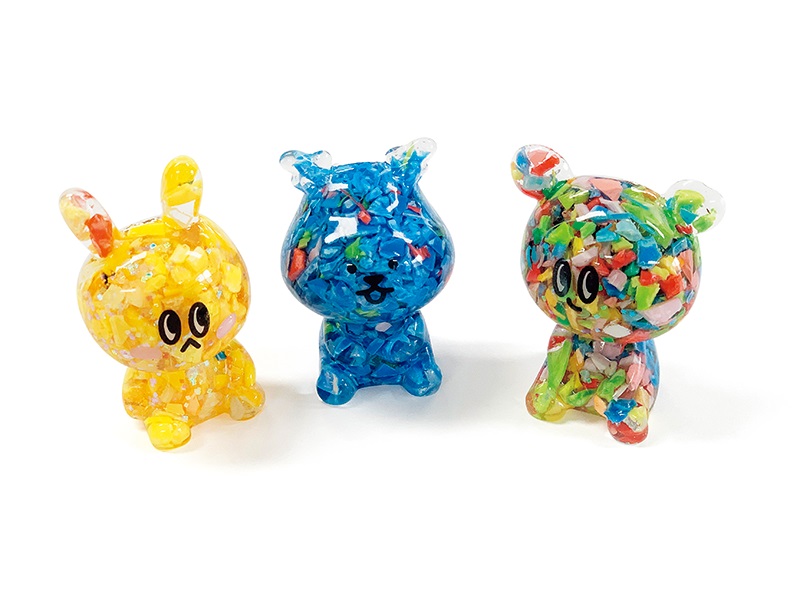아이들에게 장난감은 단순한 놀이를 넘어 정서와 신체 발달에 도움이 되는 중요한 도구지만, 쉽게 구입하고 흥미가 떨어지면 또 쉽게 버려진다. 환경 오염과 기후 위기로 플라스틱 사용에 대한 문제 의식이 높아지면서 대부분 플라스틱으로 만들어지는 장난감 역시 구입부터 수리, 수명 다한 장난감을 처리하는 방식까지 신중하게 생각해봐야 한다.
Although playing with toys is essential for children’s physical and emotional development, toys are often easily discarded once they are no longer considered interesting. As awareness of the risks of plastic use and consumption grows, there is now an increasingly urgent need for people to reconsider the life cycle of plastic toys, from their purchase and repair to their ultimate disposal.

아이들이 원하는 것이라면 모두 쥐여주고 싶은 것이 부모의 마음이다. 하지만 환경 오염과 기후 위기 문제로 인해 플라스틱 사용에 대한 문제 의식이 높아지면서 먹고, 마시고, 입고, 노는 모든 생활의 전 영역에서 이제 우리는 환경에 미치는 영향을 고려해야만 하는 상황을 맞이하게 되었다. 내 아이가 가지고 노는 장난감도 예외는 아니다.
Some parents may often feel the need to give their children anything they ask for. However, amid ever-increasing environmental pollution and the worsening climate crisis, plastic consumption is a growing concern, as is the impact of our lifestyles on the environment: what we eat, drink, and wear. The toys our children play with are no exception.
폐기물이 된 장난감 – TOYS TURNED INTO TRASH
아이들이 가지고 노는 장난감 대부분은 플라스틱으로 만들어진다. 환경 영향이 적은 소재를 이용하는 방식으로 조금씩 변화가 이뤄지고는 있지만, 문제는 쇠, 고무 등 혼합소재가 포함되어 있어 일반폐기물로 분류된다는 점이다. 즉 100% 플라스틱으로 만들어진 장난감이라면 일부는 녹여서 재활용할 수 있지만 나사나 전선 등 다른 소재가 더해진 장난감들은 곧바로 매립되거나 소각 처리할 수밖에 없다는 뜻이다.
Today, most children’s toys are made primarily of plastic. There is now a trend toward using eco-friendly materials for a range of consumer products, but unfortunately, many discarded toys are still classified as general waste. Apart from plastic, they often contain different components such as steel or rubber, used in wires and screws, which means they must either be incinerated or disposed of in landfills. Ironically, if they were made entirely of plastic, they could be partially melted down and recycled.
따라서 대부분의 장난감이 재활용되지 못한 채 폐기되고 있는 실정이다. 자원 순환이 어렵다는 문제도 있지만 폐기되는 과정에서 배출되는 환경 물질 또한 큰 문제다. 이를 위해 가장 필요한 일은 버려지는 장난감의 양을 줄이고, 최대한 쓸모를 다하도록 하는 데 있다. 장난감의 생애주기에 대해 누구보다 깊이 고민하는 사회적 기업으로는 울산에 위치한 코끼리공장이 있다.
The reality that most toys cannot be recycled is obviously a serious problem, but so too are the pollutants released during the disposal process. Ultimately, the most sustainable solution is to reduce the number of toys that are discarded by making efforts to get more use out of them. Kokkiri Gongjang, located in Ulsan in southeastern Korea, is a social enterprise that is deeply committed to extending the life cycle of children’s toys.
코끼리공장의 시작 – KOKKIRI GONGJANG’S BEGINNINGS

장난감이 버려지는 이유는 다양하다. 아이들이 금세 싫증을 느끼기도 하고, 가지고 놀다 고장 나는 경우도 빈번하다. 이럴 때마다 얼마간 방치해두다 버려지는 일이 다반사. 세상에는 새로운 장난감이 가득하기에 벌어지는 일이다. 그렇다고 아이들에게 흥미가 떨어진 재미 없는 장난감을 억지로 가지고 놀게 하는 것 역시 썩 옳은 방법이 아닌 데다, 고장 난 장난감을 고쳐주는 서비스 업체를 찾는 것도 쉽지 않다. 이는 장난감 대여관을 운영했던 코끼리공장 이채진(Lee Chae-jin 李埰瑨) 대표의 경험담이다.
Toys are discarded for a variety of reasons. They may break, or children may no longer find them interesting or entertaining. The toys are then typically left unused for a period of time before being thrown out and replaced by new ones. Persuading children to regain interest in old toys can be difficult, but trying to find someone to repair broken ones may prove to be just as difficult. Kokkiri Gongjang founder Lee Chae-jin has firsthand experience with these problems.
그는 많은 장난감이 쉽게 고장 나고 더 쉽게 버려지는 모습을 목격한 뒤, 고장 난 장난감을 고치기 위해 제조사나 유통 업체를 찾아봤지만, 600여 개의 제조 업체 중에서 수리 서비스를 운영하는 곳은 5% 남짓이었다고 한다. 이러니 아이들의 장난감이 쉽게 버려지는 소모품으로 전락할 수밖에 없는 상황이었다. 문제의식을 느낀 코끼리 공장 이 대표는 고장 난 물건을 고치는 데 능한 사람들을 불러 모아 어린이집을 돌아다니며 고장 난 장난감을 고치기 시작했다.
While running a toy rental shop, he witnessed how easily toys broke and were discarded. As he looked for toy manufacturers or distributors who would offer repairs, he found that only five percent out of the 600 manufacturers he surveyed did so. It was no wonder then that so many children’s toys were being thrown away. Convinced that this was simply unacceptable, Lee formed a group of individuals who were all skilled at fixing broken objects. This “Toy Repair Squad,” the forerunner of Kokkiri Gongjang, initially visited day care centers to repair children’s broken toys.
일명‘장난감 수리단’이자 코끼리공장의 전신이다. 어린이집에 장난감을 수리하러 가면 고마움의 표시로 장난감을 기부받는 일도 있었는데, 코끼리공장은 이렇게 받은 장난감을 다른 어린이집에 전달하여 필요한 곳에 나누는 순환 활동을 사업화한 것이다. 매년 어린이집이 방역 업체를 불러 실내 공간과 장난감들을 소독하는 점에 착안해 약품만 뿌리고 떠나는 보통의 방역 업체와 달리, 코끼리공장은 고장 난 장난감들을 모아 수리해 주고, 아이들의 관심에서 멀어진 장난감을 기부받는 식으로 장난감을 수거하여 사업 모델을 만들어 나갔다. 그리고 현재 매년 만 개 이상의 장난감을 수거해 취약계층 아이들에게 나눠주고 있다. 만 개의 장난감이라면 적어도 만 명 이상의 아이들의 시간을 풍성하고 즐겁게 보낼 수 있는 소중한 선물이 되는 셈이다.
As a token of gratitude, some of the day care centers donated toys, which were then distributed to other day care centers in need. Kokkiri Gongjang gradually built up a reputation as an organization focused on recycling and sharing toys. Every year, day care centers in Korea call in companies to disinfect their premises as well as the children’s toys. Unlike ordinary disinfection companies, the staff of Kokkiri Gongjang doesn’t just disinfect toys but also fixes any broken ones they find, and the company currently collects over ten thousand toys each year. When these are donated to marginalized children, they represent precious gifts that bring fun and enrichment to their lives.
격차를 허무는 장난감 순환 – TOY RECYCLING TO NARROW GAPS

아이들은 연령대에 맞는 장난감을 갖고 놀며 발달 단계에 맞는 성장과 발육 과정을 거친다. 경제적 여유가 있는 가정의 아이들이나 복지 예산이 많은 지자체의 보육시설에 다니는 아이들은 좋은 장난감을 다양하게 가지고 놀 수 있지만 취약계층 아이들의 상황은 다르다. 이채진 대표가 장난감을 고쳐주는 봉사단체 장난감 수리단을 사업화해 코끼리공장으로 한 걸음 나아간 이유도 여기에 있다. 수거한 장난감 중 70%에 달하는 제품을 수리하고 소독하여 넉넉하지 못한 계층의 아이들에게 나눠 준다. 이는 플라스틱 폐기물을 줄여 환경을 이롭게 하는 것뿐 아니라 아이들이 다양한 장난감을 가지고 놀게 함으로써 시기에 맞는 감각을 발달시키고 역량을 키울 수 있도록 돕는다.
Children typically play with age-appropriate toys that vary depending on their developmental stage. Children from more affluent families and those who attend well-funded government-run day care centers are able to enjoy a variety of excellent toys, but, unfortunately, the same is not true for children from lower income families. This inspired Lee Chae-jin to go beyond the Toy Repair Squad’s voluntary services and establish the Kokkiri Gongjang enterprise. It repairs and disinfects approximately 70 percent of the collected toys, before distributing them to disadvantaged children. This process not only benefits the environment by reducing plastic waste, but it also aids the development of children’s sensory skills by allowing them to play with a wider variety of toys.
이렇게 코끼리공장이 전국의 개인과 기관에서 받는 장난감은 매월 40~60톤에 달한다. 봉사활동으로 시작한 작은 단체가 경기, 인천, 울산 등 4개의 사업소를 운영하는 사회적기업이 된 데에는 너무 많은 장난감이 버려지고 있다는 문제의식, 기후 변화로 느껴지는 환경 오염의 심각성, 장난감 순환을 통해 쓰레기를 줄이고 소외계층 아동을 생각하는 사회적 가치에 있다.
Every month, individuals and organizations across the country donate between 40 and 60 tons of toys to Kokkiri Gongjang. Along the way, the initiative has grown from a small volunteer group to an established social enterprise with locations in Ulsan, Seoul, Incheon, and Gyeonggi Province. This journey and growth have been fueled by a greater awareness of mounting toy waste and its environmental impact, alongside the company’s commitment to social values such as reducing waste and caring for disadvantaged children.
장난감의 모험 – TOY ADVENTURE

코끼리공장에 모인 장난감은 여러 방법으로 순환된다. 우선 수리할 수 있는 상태의 장난감은 봉사자들이 정성껏 수리해 새 생명을 얻고 다른 기관으로 기부된다. 고쳐 쓸 수 없거나 색이 바랜 장난감의 경우 꼼꼼히 분해하는 일부터 시작한다. 장난감에서 나온 전선, 나사, 스피커 등 플라스틱을 제외한 소재들은 각각 따로 모아 다른 장난감을 수리할 때 부품으로 사용한다. 나머지 플라스틱은 소재별로 분류하는데, 녹는점이 제각각이기 때문에 합성수지, 폴리프로필렌, 폴리에틸렌 등 재활용이 가능하도록 색과 소재에 분류한다. 이렇게 나눈 플라스틱은 잘게 부수고 녹여 또 다른 제품을 만드는 데 사용된다.
The toys processed at Kokkiri Gongjang go through several stages of recycling. First, volunteers carefully fix any repairable toys, which are then donated to other organizations to extend their life cycle. Toys that cannot be fixed, or whose colors have irreversibly faded, are meticulously disassembled. Their non-plastic components, such as wires, screws, and speakers, can then be used as spare parts for other toys. The remaining plastic pieces are sorted by color and material so they can be recycled. Synthetic resin, polypropylene, and polyethylene have different melting points; once these pieces are melted down, they can be used to manufacture completely new products.
장난감 플라스틱은 유해성이 적어 혼합소재만 제대로 분리되어도 10배 이상의 부가가치를 갖는다. 따라서 코끼리공장은 초분광선별기를 이용해 플라스틱 소재를 95% 순도로 분류해 월 300톤 규모의 재생 플라스틱을 생산하고 있다. 이렇게 만든 재생 플라스틱으로 화분, 열쇠고리 등을 만들어 아이들에게 나눠주는 것도 코끼리공장의 활동 중 하나이다. 또 단체나 가족 단위를 대상으로 하는 다양한 주제의 체험 행사를 통해서도 재활용 플라스틱의 선순환을 경험할 수 있도록 하고 있다. 이렇게 장난감이 새로운 소재로 순환하는 과정을 가까이에서 보게 된 아이들은 흥미가 떨어진 장난감을 바로 버릴 것이 아니라 자원으로서 충분히 가치 있고 재사용, 재순환할 만한 물건이라는 점을 배울 수 있게 된다.
Toy plastics have relatively low toxicity and are over ten times more valuable if their components are properly separated. For this reason, Kokkiri Gongjang uses hyperspectral sorting and recycling machines that produce around 300 tons of recycled plastic with 95 percent purity every month. This is used to make items such as flowerpots and key chains, which are then distributed to children. Kokkiri Gongjang also hosts educational events where groups and families can witness its closed-loop recycling process. The experience helps children understand that the toys they no longer play with should not be thrown away but can instead be reused or recycled.
자원순환이 만드는 교육 – EDUCATIONAL BENEFITS OF RESOURCE RECYCLING

코끼리공장에서는 더 이상 가지고 놀지 않는 장난감을 가득 안고 오는 아이들을 볼 수 있다. 꼬물꼬물한 손가락으로 기부자에 자신의 이름을 직접 적고, 가져온 장난감을 기부하는 아이들의 모습은 대견하고 사랑스러워 보인다. 이렇게 기부하고 난 아이들은 코끼리공장에서 수리하고 소독한 장난감 중 하나를 골라 가져갈 수 있게 했다. 기부의 즐거움이 더해지는 순간이다. 더 이상 가지고 놀지 않는 장난감을 휙 버리거나 방치하지 않고 필요한 친구들에게 나눠주는 기부 활동은 분명 아이들에게 큰 배움이 된다. 자원의 소중함, 나눔의 보람, 순환의 가치를 자연스럽게 배우는 경험이 되어 환경 보호, 에너지 절약에 대한 이해도를 높일 수 있기 때문이다.
Children who visit Kokkiri Gongjang can also donate their unwanted toys. Becoming donors instills in them a sense of pride in having done something good. Adding joy to the act of giving, they can then choose to take home one of the toys either repaired or disinfected by Kokkiri Gongjang. Sharing unused toys with those in need, rather than throwing them away or neglecting them, undoubtedly teaches children a valuable lesson. Overall, the Kokkiri Gongjang experience raises awareness of the importance of environmental protection, energy conservation, and caring for children from disadvantaged families.
유다미(Yoo Da-mi 劉多美) 에디터
Yoo Da-mi Writer
